Leadership Book Review: "Peak"
Latest Posts
- 2024 Reading List for Leaders
(posted: 07/01/2024)The right book can be a leadership game-changer.
- Coach's Notebook: Exec Presence for Leaders
(posted: 05/08/2024)As a leader your charisma is critical. Learn how to develop it!
- New Year's Resolutions vs New Chapters
(posted: 02/01/2024)Forget New Year's...Your new chapter can begin when you are ready!
Blog Archives
Kristi posts to her site about once a month, but frequently more often. She also appears as a featured contributer on select other sites. If you would like to be notified when new blogs are posted, please subscribe to our newsletter.
If you are interested in Kristi guest posting to your site feel free to contact us.
Leadership Book Review: "Peak"
(posted: January 23rd, 2012)

Questions: As growing leaders in the business world, we might ask ourselves these questions.
- Why are some people and organizations more innovative, influential, and profitable than others?
- Why do some command greater loyalty from customers and employees?
- Why do some have repeat success?
Question Behind the Questions:
"What can we do to enhance this in our organizations?"
To continue answering the questions above, we go to another book in our series called the Leadership Book Review.
Leadership Book Review
Peak: How Great Companies Get their Mojo from Maslow
by Chip Conley
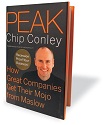 Peak is dedicated to helping you and your company build and sustain high-performance relationships with your employees, customers, investors, suppliers, and the community.
Peak is dedicated to helping you and your company build and sustain high-performance relationships with your employees, customers, investors, suppliers, and the community.
"A musician must make music, an artist must paint, a poet must write, if he is to be ultimately at peace with himself. What a man can be, he must be. This need we call self-actualization. It refers to man's desire for self-fulfillment, namely to the tendency for him to become."
Abraham Maslow
He provides us with a brilliant analysis to the absolute necessity of Maslow's hierarchical paradigm in unleashing talent and commitment of employees, customers and investors.
"Don't think about profit, think about customer service; profit is a by-product of customer service, it's not an end in and of itself. The customer always comes second; our employees are first."
Herb Keller
Maslow's hierarchy of needs distilled down into 3 essentials levels:
- survival
- success
- transformation
Conley provides some simple and effective best practices for how you can move up the pyramid so that these relationships flourish and help you sustain "peak performance."
The Employee Pyramid
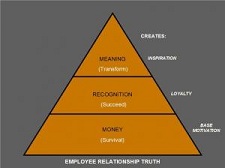 !Survival and Compensation
!Survival and Compensation
How can your company better address compensation needs of its employees? Are you confident these base needs are met?
"We have known for 50 years that money alone does not motivate to perform. Dissatisfaction with money grossly de-motivates. Satisfaction with money is mainly a hygiene factor. People are motivated instead by interesting work, challenge and increased responsibility."
Peter Drucker
Success and Recognition
Mary Kay's approach is praising people to success.
"She advises her managers to pretend that every single person you meet has a sign around his or her neck that says, 'make me feel important'. Not only will you succeed in sales, you will succeed in life."
Employees join companies but they leave managers.
"What people want most from their supervisors is the same thing that kids want most from their parents: someone who sets clear and consistent expectations, cares for them, values their unique qualities, and encourages and supports their growth and development."
Gallup
70% of the variability in employee satisfaction is attributable to the quality of the employees' relationship with their manager.
Transform and Meaning
- Find meaning in one's work. Both in what you do daily, and in the company's sense of mission. This is one of the rarest but most valuable qualities anyone can have in their job.
"People want to work for a cuase, not just for a living."
William Pollard
- The more you can create peak experiences the more likely your employees will see the meaning in what they and the company do.
Take a look at the diagram:
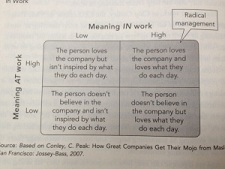
Ask yourself 3 questions:
- Where do you fall in the diagram?
- Where do the people who report to you fall?
- Where do the people you report to fall?
The Customer Pyramid
Survival and Expectations
Satisfaction does not create loyalty.
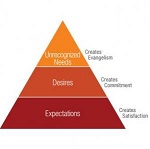 No company can succeed without addressing its customers' base needs, but too many executives think that simply meeting the basics of satisfaction is a true win for their company.
No company can succeed without addressing its customers' base needs, but too many executives think that simply meeting the basics of satisfaction is a true win for their company.
Bain research teams found that 60 to 80 percent of customer defectors score themselves as "satisfied" or "very satisfied" on surveys preceding their defection.
Expectations are what drive customer satisfaction or disappointment. But just meeting their expectation does not create long term loyalty.
Success and Desires
The more you can get a customer to teach you about his needs, provided you can meet them, the more loyal that customer will become. The won't want to have to expend the time or take the risk to re-teach some other firm what he's already taught you.
Great service comes from finding the right people and creating a culture that is devoted to meeting the desires of their customers.
It's pretty easy to spot the overwhelming strong candidate or even an underwhelmingly weak candidate. It's the 'whelming' candidate you must avoid at all costs, because that's the one who can and will do your organization the most long lasting harm. And because you either can't or don't fire them, you and they conspire to send a dangerous message to your staff and guests that 'average' is acceptable.
Transform and Unrecognized Needs
What's at the peak is often intangible and priceless, yet few companies "seek the peak."
The first step is asking:
"What business are we in?" and "What are the unrecognized needs of our customers?"
Then you need to not only deliver what the customers want, but also what they'd never think to ask for.
"If I had asked my customers what they wanted, they would have said a faster horse."
Henry Ford
Great examples of this companies who get it right have a profound impact on the customers life or how they see themselves; Harley Davison, Apple, The Geek Squad, Target, Whole Foods, Southwest and Konica.
Four themes at the top of the pyramid:
- Help your customers meet their highest goals.
- Give your customers the ability to truly express themselves.
- Make your customers feel like they're part of a bigger cause.
- Offer your customers something of a real value that they hadn't even imagined.
The Investor Pyramid
Survival and Transaction Alignment
"You can't meet investors' expectations if you don't understand their goals."
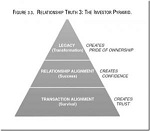 The reason many company-investor relationships don't work out is because the two parties didn't communicate their individual intent to see if they had the same goals.
The reason many company-investor relationships don't work out is because the two parties didn't communicate their individual intent to see if they had the same goals.
Success and Relationship Alignment
"Business is simple. Management's job is to take care of the employees. Employee's job is to take care of the customers. Happy customers take care of the shareholders. It's a virtuous circle."
John Mackey, CEO, Whole Foods
Transformation and Legacy
At the peak of the investor pyramid, it's ultimately a legacy, not liquidity that people seek.
"Our first half of life is about how to make a living, and our second half has the promise of being about how to make a life."
One of Gallup Organizations studies found that a highly engaged employee and customer leads to on average, 4 times more financial productivity.
So what do you and your company need to do to ensure you have a culture that will enhance your profits?
Culture is a framework of values and meaning. It is not a system of specified processes geared specifically to efficiency and results.
"We fear our highest possibilities. We are generally afraid to become that which we can glimpse in our most perfect moments, under conditions of great courage. We enjoy and even thrill to the godlike possibilities we see in ourselves in such peak moments. And yet we simultaneously shiver with weakness, awe, and fear before these very same possibilities. Obviously the most beautiful fate, the most wonderful good fortune that can happen to any human being, is to be paid for doing that which he passionately loves to do."
Abraham Maslow
- How can you live the principles of self-actualization?
- '''What shifts do you need to make to truly be self-fulfilled, not just in the workplace but throughout all components of your life?
I'd love to hear your thought!
